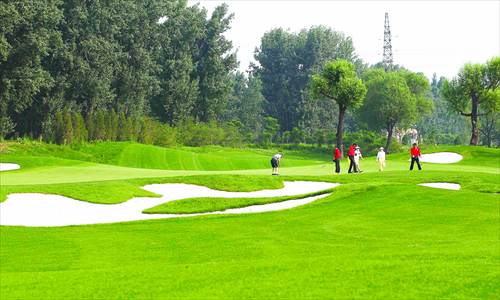Sucking Beijing dry



Acustom theater for former Cirque du Soliel director Franco Dragone's House of Dancing Water is being built near the 798 Art District in Beijing right now, which is exciting news for theater fans but perhaps worrisome for environmentalists.
Water experts emphasize Beijing indeed has serious water problems, but caution critics to focus their ire on more serious threats - golf courses and public hot spring bath houses.
The theater, which is being jointly built with the municipal government, covers an area of 1.2 million square meters. The show, a mix of theater, acrobatics and stunts, requires 7.4 million gallons of water, the equivalent of 13 Olympic swimming pools.
Saving water is an imperative for the parched municipality, so many voices are questioning whether the project is a waste of water.
Parched and dry
Beijing is one of the world's driest big cities. The per capita quantity of water resources in Beijing is only 119 cubic meters, 12 percent of the 1,000 cubic meters per person that is the international standard for supporting human life, according to the Beijing Water Authority.
Liang Shao, 28, who works in a trade company nearby 798, told Metro Beijing he thinks the municipal government should be more cautious about launching water-hungry projects. "Hearing that news really made me surprised, because it seems the theater will use a lot of water, which is definitely a huge waste for a dry city like Beijing," he said.
The municipality posted a response to this line of criticism on its official microblog, saying, "The theater will have an indoor water recycling system installed, which can collect the evaporated and used water, so in fact the actual water use will be little." The theater has to pay a special high "business" rate for the water, which is three times the rate that citizens pay for their drinking water.
Ma Jun, director of the Institute of Public and Environmental Affairs and a prominent environmentalist who specializes in water protection, said the claim the theater can use water economically is plausible, if the recycling system really functions as planned.
"Technically, there is no difficulty in saving water in an indoor recycling system, but supervision is needed to guarantee it can work over the longer term," said Ma.
Two real threats
Ma noted that compared to the theater, golf is the real threat to the water resources in Beijing. "Currently Beijing has many golf clubs, each of them uses lots of water to irrigate the lawns every day. Most water used on lawns evaporates quickly, which is a huge waste," said Ma.
All golf courses are thirsty drinkers. China Central Television quoted Su Derong, professor of grassland science from Beijing Forestry University, saying a standard 18-hole golf course will use 400,000 tons of water every year. Considering Beijing also has many 27-, 36- and even 54-hole courses, the total sum would be even larger. The CCTV report said the whole golf industry uses up 40 million tons of water each year.
A search on consumer website dianping.com shows Beijing has 74 golf courses, while the Southern Weekly newspaper pegs the number at 132.
For over three years, Hu Kanping, director of the Department of Research and Communication in Chinese Ecological Civilization Research and Promotion Association, has been researching industries that consume high amounts of water in Beijing. Hu said residents in Beijing can use 85 to 150 liters of water daily per capita, which is 31 to 51 cubic meters every year. According to these numbers, we can extrapolate that the golf industry in Beijing goes through enough water to support around one million residents.
Metro Beijing asked the Beijing Water Authority for concrete data, and was informed that there are no official statistics for water usage by the golf industry.
Sucked dry beneath our feet
Hot spring businesses are another threat that is draining Beijing's scarce water supplies, especially underground reserves.
Ma said the hot springs near the surface have already been sucked dry. "Overuse by hot springs drained these surface reserves. All the current hot springs are actually pumped from deep underground, sometimes from kilometers below," he said.
And the exploitation of deep underground water reserves continues, worsening the situation. Duan Jinping, publicity officer with the Beijing Geology and Mineral Resources Exploration and Development Bureau, said the bureau detected Beijing's underground water table has been declining for a long time.
"Over years, Beijing's underground water table continues to fall. The use of deep underground water is one of the key reasons," said Duan.
Restrictions repeatedly ignored
On June 1 Beijing adopted its new regulations on saving water that strictly limit the development of all high-water-consumption industries including golf courses and hot springs. However, Hu is still worried. "The administration over golf courses is too loose," Hu said.
Hu is worried because China called for a stop on building golf courses in 2004, and gave such construction a total ban in 2006, yet courses keep mushrooming, even though the country has released 10 different prohibitions.
The Beijing News reported that the municipality was home to 20 golf courses in 2004, and had more than 70 last year. The golf courses sneak around the rules by calling themselves a sport park or a lawn, according to the Beijing News.
Ma believes tougher supervision would help to improve the situation. He suggested recycling systems be installed, combined with frequent inspections, to ensure they are saving water.
"And what's more important, consumers, government and industry insiders should be aware of the green consumption concept, and choose the most eco-friendly way of consuming and developing water resources," said Ma.